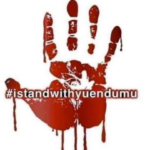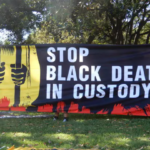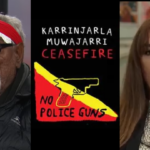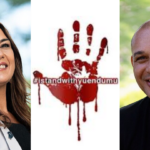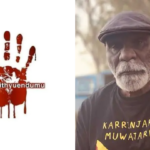Chief Minister Dismisses Findings of Institutional Racism in Northern Territory Police Force

Released on 7 July 2025, the 683 page coronial report into the killing of Warlpiri Luritja teenager Kumanjayi Walker by then NT police constable Zachary Rolfe, which was produced by NT coroner Elisabeth Armitage, was so damning in its finding that institutional racism is pervasive at every level of the Northern Territory Police Force that it left NT chief minister Lia Finocchiaro speechless.
Finocchiaro is also the NT police minister. Since taking office in August 2024, her Country Liberal ministry has overseen a law-and-order crackdown in a jurisdiction already recognised for its racist and authoritarian policing and incarceration system. Finocchiaro has a focus on punishing children, and her reforms have seen about 40 Aboriginal people being taken into custody on a daily basis.
The Walker inquest found the NT Police Force is “an organisation with all the hallmarks of institutional racism”, which permitted Rolfe, a constable in his late 20s, to continue prioritising the use of excessive force during arrests involving Aboriginal males, despite repeated complaints, because dehumanising and devaluing First Peoples is the norm within the institution.
So, the NT chief minister really ought to have been tripping over herself to deliver a response, but instead, her silence was being deemed either “cowardly” or “arrogant” three days later, and when she did finally broach the subject a fortnight afterwards, it was to call for an overhaul of the coronial system due to the length and the cost of the Walker inquest.
Indeed, with the introduction of the Youth Justice Legislation Amendment Bill 2025 on Wednesday, the Finocchiaro government has indicated that the pause that Armitage’s delivery of her inquest findings had afforded the Northern Territory, and further, the entire nation of Australia, is to be rode roughshod over, as NT Country Liberal architects proceed with plans to heighten incarceration.
Blaming the messenger
The National Indigenous Times reported that Finocchiaro had twice deflected from addressing the Walker inquest prior to elaborating on it during a 21 July Mix FM interview, in which she took aim at the Coroners Act 1993 (NT), and she called for an overhaul of the legislation, because it had allowed the inquiry to drag on for three years, and she claimed its cost of almost $8 million was too much.
“The coronial process is obviously a very important process but when a usual coronial inquest costs six thousand dollars and one as complicated as the four domestic violence women costing half a million, you can see how this one has completely blown out,” said the NT police minister, who is overseeing a policing agency that’s been found to turn a blind eye to institutional racism.
“I think that’s something the attorney general is looking at as part of our broader justice reform package,” she added in terms of what might be done to correct the issue she had identified with the coronial system. The vast majority of the millions spent on the inquest, or about $5.5 million, however, was spent by the NT police on importing senior lawyers from interstate.
Armitage had made 32 recommendations in the Walker inquest that the chief minister did not give consideration to, which included a partial de-arming of police, an anti-racism strategy, a broader cultural reform of the institution, clear procedures on deaths in custody and the implementation of an early intervention policy that might identify problematic officers before it’s too late.
Finocchiaro further told Mix that the Walker inquest had “raised some serious issues that require consideration”, but she believes that her government having been overhauling the criminal justice system for close to a year now, has probably gone a long way to addressing this.
The great incarcerator
The incarceration rate in the NT is 1,381.6 persons per every 100,000 adults, which when compared with the rates of all nations across the planet it comes in at second place behind El Salvador, which incarcerates 1,659 persons per every 100,000 adults.
El Salvador, however, has been on an imprisonment drive since dictator Nayib Bukele called a state of emergency in March 2022.
The Northern Territory has the largest portion of its population made up of the continent’s First Peoples than any other Australian jurisdiction. The 2021 Census puts this at 30 percent, or 76,487 Aboriginal people amongst a broader Territorian population of 248,151 people.
Of the 2,686 adults locked up in the NT in March, 2,373 were Aboriginal and/or Torres Strait Islander adults, which accounted for 88 percent of inmates.
So, when the NT chief minister launched a law-and-order drive last year, it has had an ‘us against them’ feel to it. ‘Us’ is the European settler colonial government and population and ‘them’ is the First Peoples, who have inhabited the region for over 60,000. The tough-on-crime package most prominently targets the Aboriginal people living in the jurisdiction, which is reflected in the statistics.
The Youth Justice Amendment Bill introduced into parliament this week seeks to place the NT youth justice system under the watch of NT Corrections and out of the care of Communities. The legislation will see the reestablishment of deadly spit hood use on children in kiddie prisons, and it removes the requirement that judges and magistrates only consider throwing a kid in gaol as a ‘last resort’.
“Let us be clear: spit hoods are instruments of torture. They are used to degrade, control and silence. Their deadly consequences are well documented,” said National Network of Formerly Incarcerated Women spokesperson Debbie Kilroy “To bring spit hoods back, especially for use on children, is a grotesque failure of leadership. It will not prevent harm. It is harm.”
“The removal of the principle that detention must be a last resort for children flies in the face of national and international human rights obligations,” the lawyer made certain. “Many of the children who appear before the courts are themselves victims: victims of violence, poverty, neglect, racism and state failure. They are not born ‘offenders’, they are criminalised.”
The law-and-order drive continues
Following the backlash from the announcement that ever more tough-on-youth-crime laws would be before NT parliament this week, Finocchiaro was back on Mix on Tuesday, stating, “The Children’s Commissioner can come out and say things like ‘everyone should be safe but’, and the land councils can come out and call me racist and whatever else they want to carry on about.”
“Territorians put me here, and they gave me an important job to do, and I can tell you, we’re doing that job,” said the NT police minister, as she continued to frame her law-and-order drive, as an ‘us against them’ scenario. “The noisy people and the apologists and the activists, they can pack up their placards and go home. We’re not listening to you.”
In its second sitting day in parliament, the NT Country Liberal government introduced five new law-and-order pieces of legislation, which included an overhaul of the NT bail regime that resulted in the reinstatement of breach of bail for youths, amended the framework so the adult system now applies to children, and it expanded the number of offences to which the presumption against bail applies.
This has seen a 44 percent rise in the number of adults being remanded, or held in gaol before being convicted or sentenced, as well as a 57 percent increase in the number of children the NT is incarcerating pretrial.
“I stand in solidarity with the land councils and call for a vote of no confidence in the Finocchiaro government,” said Justice Not Jails spokesperson Nyikina woman Natalie Hunter. “The Country Liberal Party continues to inflict harm on Aboriginal people in every area of their lives like never before. Children are being tortured in police watch houses.”
“The federal Labor government needs to step up and do something to stop the human rights abuses,” she underscored. “The Commonwealth should take away NT government funding and direct the funding to Aboriginal community-controlled organisations as a matter of urgency to protect our children until the NT government is prepared to sit down with Aboriginal leaders and work with us.”


